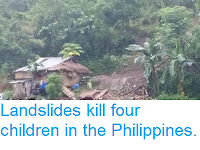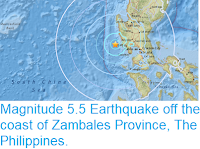Three people have been confirmed dead and another one is missing follwing a series of flash floods in the Metro Manila area of Luzon Island, the Philippines, this week. The three people who died have been identified as RJ Basuecos, 26, of Manila, Dioscoro Camacho, 36, of Marikina, and Gloria Mendoza, 61, of Quezon. The missing man is Edgar Bugaay, 50, of Quezon, who has not been seen since he was swept away by floodwaters on Sunday 12 August 2018. The incidents have been caused by heavy rains associated with the
Southwest Monsoon, which lasts from May to October in The Philippines.
Flooding in Marinka in the Metro Manila region of Luzon Island this week. Reuters.
Monsoons
are tropical sea breezes triggered by heating of the land during the
warmer part of the year (summer). Both the land and sea are warmed by
the Sun, but the land has a lower ability to absorb heat, radiating it
back so that the air above landmasses becomes significantly warmer than
that over the sea, causing the air above the land to rise and drawing in
water from over the sea; since this has also been warmed it carries a
high evaporated water content, and brings with it heavy rainfall. In the
tropical dry season the situation is reversed, as the air over the land
cools more rapidly with the seasons, leading to warmer air over the
sea, and thus breezes moving from the shore to the sea (where air is
rising more rapidly) and a drying of the climate.
Diagrammatic representation of wind and rainfall patterns in a tropical monsoon climate. Geosciences/University of Arizona.
Much of Southeast Asia has two distinct Monsoon Seasons, with a Northeast Monsoon driven
by winds from the South China Sea that lasts from November to February
and a Southwest Monsoon driven by winds from the southern Indian Ocean from March to October. Such a double Monsoon Season is common
close
to the equator, where the Sun is highest overhead around the equinoxes
and lowest on the horizons around the solstices, making the solstices
the coolest part of the year and the equinoxes the hottest.
The winds that drive the Northeast and Southwest Monsoons in Southeast Asia. Mynewshub.
Follow Sciency Thoughts on
Facebook.









